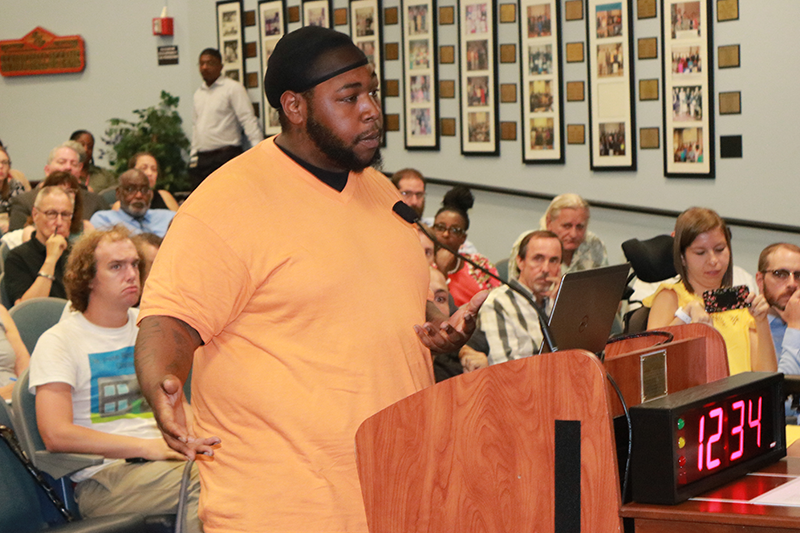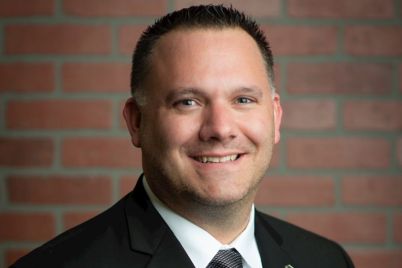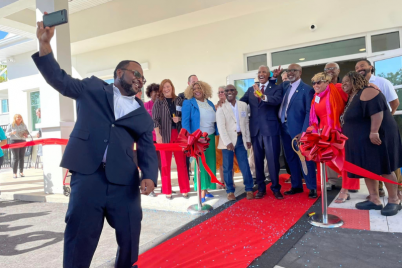Twenty-three-year-old Diguel Atkins stumped the panel when he asked why affordable housing is such a complicated subject.
By J.A. Jones, Staff Writer
ST. PETERSBURG – The topic of affordable housing was up for discussion July 9 at the 2019 Affordable Housing Round Table & Community Discussion held at the Sunshine Center.
Affordable housing has become a critical issue across the country, and recent data indicates the Tampa-St. Pete region is quickly becoming unaffordable for many citizens, with those earning minimum wage needing to work more than 80 hours a week to afford a two-bedroom apartment – or nearly $22 an hour for a 40-hour workweek.
It is still unclear how the city plans to address these issues.
Currently, it’s easy to find high-income dweller developments in the city such as the Burlington Townhomes (Burlington Avenue and 8th Street North) or the proposed $117 million Ascent St. Petersburg project, described as a “marquee luxury apartment tower” (1st Avenue North and 2nd Street North) or the recently completed 930 Central flats with one-bedrooms renting for $1,900.
But the city’s commitment to affordable housing is still questionable, and some community members even questioned their decision to hold the July 9 meeting at 10 a.m. when most people are at work. Some noted that it seemed to signal a reluctance by the city to truly engage the community in a conversation on a problem it has no current solutions for.
But councilperson Brandi Gabbard, who convened the panel, has expressed ongoing concern regarding the city’s affordable housing crisis.
In June, Gabbard and other city council members announced their support for a “lockbox” affordable housing fund that would function as a lockbox to restrict a portion of city funds to be used solely for affordable housing.
Indeed, the July 9 meeting revealed that the state legislature had again raided the Sadowski Affordable Housing Fund, a state fund designed to provide a dedicated revenue source for affordable housing, as it had for the last 12 years. In 2017, it was reported that of the $1.87 billion in the Sadowski fund, nearly $1.3 billion has been “diverted” to “other purposes.”
Gabbard co-hosted the panel with Sen. Darryl Rouson and Rep. Ben Diamond.
Panelists included Joe Farrell, director of governmental affairs for the Pinellas Realtor Organization, Watson Haynes, president & CEO of the Pinellas County Urban League, Scott MacDonald, executive vice president and chief financial officer at Blue Sky Communities, an affordable multifamily real estate development company and Brother John Muhammad, lead organizer for the New Deal for St. Pete.
Also on the panel were former city councilman Karl Nurse, who now oversees the housing workgroup for the Grow Smarter initiative, Ken Rush, chief operating officer of Habitat for Humanity of Pinellas County and Ben Toro-Spears of the Florida Housing Coalition.
Community members lined up to for their turn to address the panel. None, however, solicited more discussion than 23-year-old Diguel Atkins.
“Why are you afraid of the south side and the black community when we don’t have a history of kicking y’all out of y’all neighborhoods? Y’all have a history of kicking us out of our neighborhoods. We don’t have a history of brutalizing y’all. Y’all have a history of brutalizing us.”
Atkins’ mother grew up in the Laurel Park housing development in the Gas Plant neighborhood. The housing development along with other homes, schools, businesses and churches were either bulldozed or relocated to make room for Tropicana Field. There is no trace that a vibrant African-American community ever existed.
“My mother grew up in Laurel Park, and I have no history to be able to look and go see where she played or where she grew up. And the same thing is happening in my community in Bartlett Park.”
His mother struggled to find affordable housing, and he’s faced with the same daunting task. Atkins said affordable housing is becoming harder and harder to find in the Bartlett Park community and foreclosures are on the rise.
Bartlett Park experienced white flight in the late 60s and early 70s when St. Pete was forced to desegregate. With its proximity to downtown, it is now once again a sought after neighborhood.
“We’re being robbed of our culture. You say that it’s affordable housing, but there are no jobs that pay enough. Yeah, there are jobs, but these jobs don’t pay enough for us to be able to make these decisions that you guys put on us that are so heavy and so effective.”
Atkins wanted to know why affordable housing is such a complicated subject, and why the treatment of low wage earners is so unjust.
“It’s not complicated to spend $84 million on the police building. It’s not complicated to build high rises downtown. Why is it so complicated to talk about the fact that we’re being bullied? We’re being bullied!”
Nurse couldn’t answer his question but helped Atkins make his point. He said on the north end of the Bartlett Park community, located just south of downtown, developers are buying and destroying foreclosed properties and building $400,000 homes “that are selling like crazy.”
Also, as you get farther south of the neighborhood, you run into a flood zone that adds $10,000 or more to the price of building a house. Nurse reported that 10 of the 11 recently foreclosed lots in the area went to non-profit affordable housing organizations, but that is a mere pittance compared to the hundreds of high rise units being built in downtown.
To try and answer Atkins’ question, Muhammed said there is a long history of racism in the U.S., and a large segment of the population doesn’t understand the difference between responsibility and blame.
“And we’re saying, ‘Look, I understand it was generational, you probably weren’t here…your family may not have any connection to that, but you have benefited from what your ancestors have done,'” he said. “We’re not saying it’s your fault or anybody’s fault, but we are saying that it’s your responsibility.”
Rouson said the conversation must begin somewhere and should be expanded with action as a result. Hopefully, the next meeting will take place at a time that is more convenient to working community members.
While no unique or new ideas were shared, Gabbard noted there would be more conversations to come.
To reach J.A. Jones, email jjones@theweeklychallenger.com













